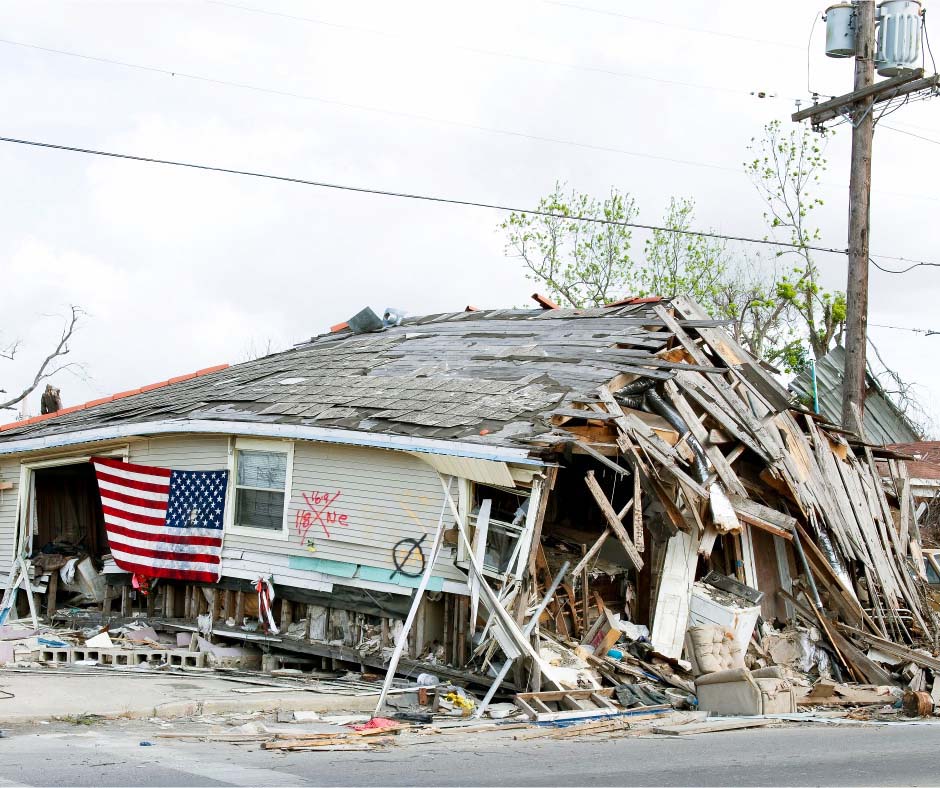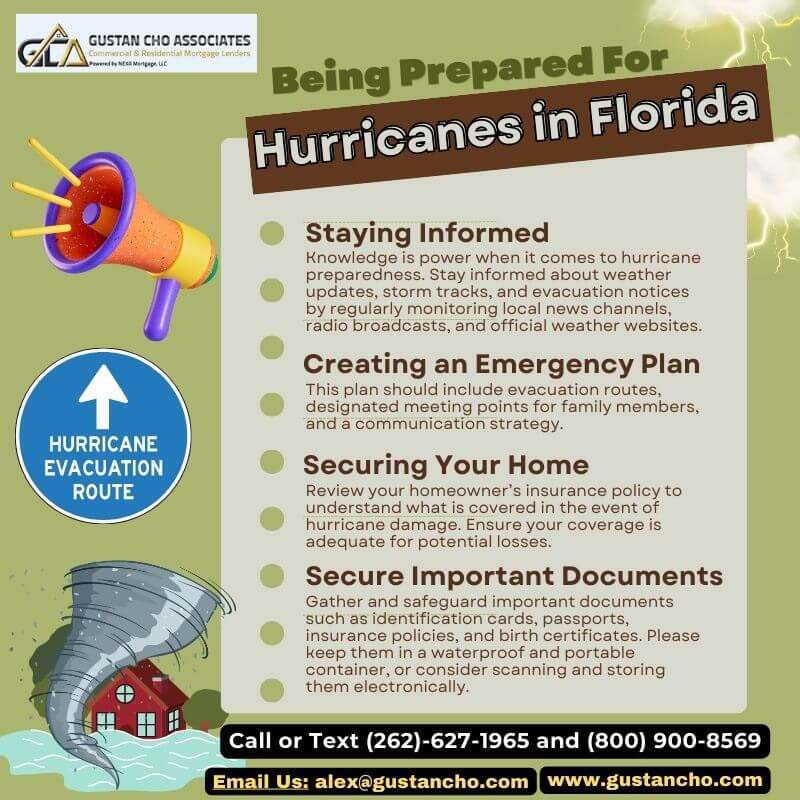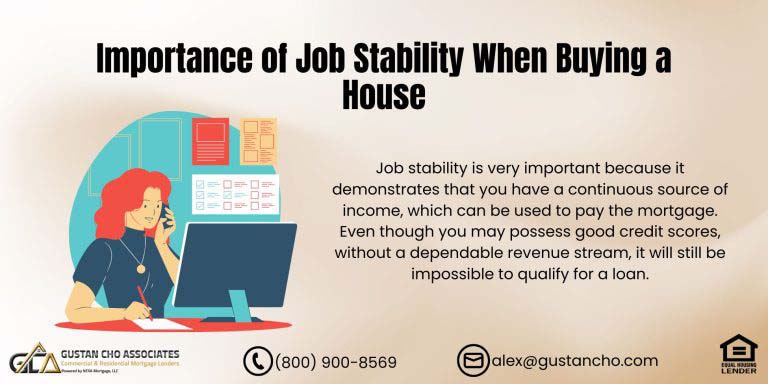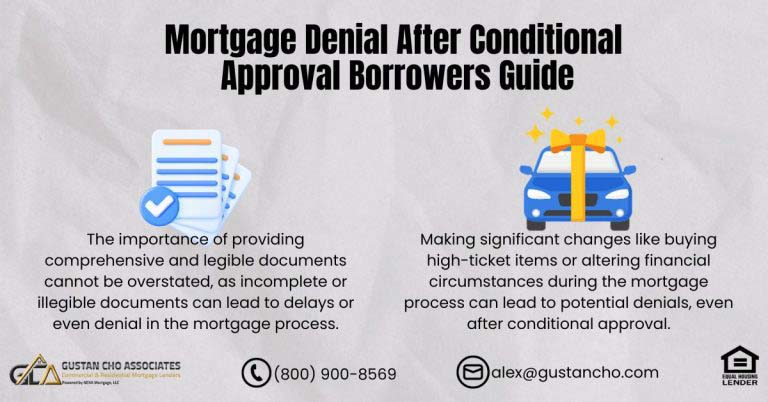In this guide, we will cover being prepared for hurricanes in Florida. Homeowners and renters in Florida’s biggest fear is the devastation hurricanes can cause. We are ensuring Safety and Security. Hurricane season has just started! Living in Florida means being mindful of the potential impact of hurricanes, which are a recurring natural phenomenon. The hurricane season runs from June to August.
There is no forecast on the type of strength and damage a hurricane can do in Florida. The best protection is being prepared for hurricanes by making sure your home is secured and you and your family are in harms way.
Homes and infrastructure pose risks to personal safety. Therefore, residents must be well-prepared and equipped to face these events head-on. This article on Gustan Cho Associates will explore crucial steps and strategies for hurricane preparedness in Florida, ensuring.
Being Prepared For Hurricanes By Staying Informed
Knowledge is power when it comes to hurricane preparedness. Stay informed about weather updates, storm tracks, and evacuation notices by regularly monitoring local news channels, radio broadcasts, and official weather websites. Ronda Butts, a dually licensed realtor at Gustan Cho Associates, advises the following:
Being prepared for Hurricanes is a must if you live in the Southeastern section of the United States. Familiarize yourself by being prepared for hurricanes with the different hurricane categories.
Understand the potential risks associated with each level. Signing up for emergency alerts and following reliable meteorologists on social media can also provide timely information. You can get information at ready.gov/hurricanes.
Being Prepared For Hurricanes By Creating an Emergency Plan
Developing a well-thought-out emergency plan is essential for every household in hurricane-prone areas. Florida is one of the most hard-hit hurricane hotspots in the country. This plan should include evacuation routes, designated meeting points for family members, and a communication strategy. Assign roles and responsibilities to each family member during an emergency. Prepare an emergency kit with essential supplies such as non-perishable food, water, flashlights, batteries, a first aid kit, and important documents.
Being Prepared For Hurricanes By Securing Your Home
Florida homeowners should review their insurance policy for hurricane coverage. Protecting your home from hurricane damage depends on reinforcing doors and windows with storm shutters or impact-resistant glass. Trim trees and remove loose branches that could become projectiles during high winds. Consider installing hurricane straps or clips to strengthen your roof. Additionally, secure or store outdoor furniture, grills, and other objects that strong winds and cause damage could pick up. David Marden, a dually licensed insurance agent, and mortgage officer who is an expert in hurricane insurance, advises the following:
Review your homeowner’s insurance policy to understand what is covered in the event of hurricane damage. Ensure your coverage is adequate for potential losses. De-flood insurance, as standard policies, typically does not cover flood-related damage. Consult an insurance professional to assess your coverage needs and make any necessary adjustments.
Don’t think that just because your insurance agent never told you about flood insurance, it isn’t necessary. Even the mildest hurricane can cause tens of thousands of dollars of destruction. Elderly homeowners who have their homes paid for need to make sure their Florida homes are adequately insured from hurricanes in Florida.
Secure Important Documents
Gather and safeguard important documents such as identification cards, passports, insurance policies, and birth certificates. Please keep them in a waterproof and portable container, or consider scanning and storing them electronically. This ensures you can access vital information even if the physical copies are damaged.
Post-Storm Safety After the hurricane has passed, it is crucial to prioritize safety. Stay tuned to local news on road conditions, power outages, and other post-storm developments. Be cautious of downed power lines, standing water, and potential structural damage. Avoid using generators indoors and follow instructions from local authorities regarding water usage and food safety.
Being prepared for hurricanes in Florida is a responsibility all residents should take seriously. By staying informed, creating an emergency plan, securing your home, reviewing insurance coverage, preparing for evacuation, securing important documents, and prioritizing post-storm safety, you can significantly enhance your ability to weather these powerful storms. Remember, early preparation is the key to ensuring the safety and security of property in the face of a hurricane.
How To Protect Your Homes Being Prepared For Hurricanes in Florida
This section will cover how many hurricanes hit the Southeastern section of the United States in the past ten years. The southeastern United States has endured its fair share of hurricanes over the past decade. Being prepared for hurricanes with an evacuation plan is a must, says Bill Burg, a dually licensed realtor and loan officer, and a Florida resident since 2017.
If local authorities issue evacuation orders, it is crucial to follow them promptly. Plan where you will go and arrange accommodation, especially if you have pets. Pack essential items, including medications, important documents, and personal items, before leaving. Share your evacuation plan with family and friends to keep them informed about your whereabouts.
These powerful storms have left lasting impacts on communities, infrastructure, and the lives of residents. Highlighting their destructive force and the lessons learned from each event, here are the significant hurricanes that have battered the region in the last ten years, Hurricane Matthew (2016).
Hurricane Matthew Made Land In 2016
Hurricane Matthew made land in October 2016, affecting multiple southeastern states, including Florida, Georgia, South Carolina, and North Carolina. With sustained winds of 165 mph, it caused widespread destruction and intense flooding and claimed over 40 lives. The storm highlighted the vulnerability of coastal areas and emphasized the importance of early evacuation, emergency preparedness, and robust infrastructure to withstand hurricane forces.
Hurricane Irma (2017)
In September 2017, Hurricane Irma, one of the strongest hurricanes ever recorded in the Atlantic, struck Florida and impacted other southeastern states. Winds reaching 185 mph caused extensive damage, particularly in the Florida Keys. The storm’s impact on power grids and fuel shortages demonstrated the need for improved resilience and emergency response coordination.
Hurricane Florence (2018)
Hurricane Florence landed in September 2018, affecting primarily North and South Carolina. While the storm weakened before reaching the coast, its slow-moving nature and heavy rainfall led to catastrophic flooding. Communities experienced record-breaking rain, resulting in extensive property damage, widespread power outages, and significant disruptions to daily life. The event highlighted the importance of flood mitigation measures and emergency management systems.
Hurricane Michael (2018)
Hurricane Michael struck the Florida Panhandle as a Category 5 storm in October 2018. It was the strongest hurricane to land in the region, causing devastating destruction in communities such as Mexico Beach. With sustained winds of 160 mph, it left a trail of flattened homes, uprooted trees, and widespread power outages. The event underscored the need for improved building codes and greater awareness of hurricane risks, even in less frequently affected areas.
Hurricane Dorian (2019)
In August 2019, Hurricane Dorian impacted the southeastern United States, particularly the Bahamas and parts of the Carolinas. Although the storm skirted the coast, it caused significant damage and severe flooding in the Bahamas. The event highlighted the importance of international cooperation in disaster response and the need for accurate and timely communication to aid evacuation efforts.
Hurricane Laura (2020)
Hurricane Laura landed in August 2020, affecting Louisiana and Texas and causing significant damage further inland. Winds reaching 150 mph led to destructive storm surges, widespread power outages, and structural damage. The event emphasized the necessity of comprehensive hurricane preparedness plans and evacuation strategies, particularly for vulnerable populations.
Lessons Learned and Moving Forward Being Prepared For Hurricanes
The past decade of hurricanes in the south-eastern United States has provided valuable lessons for residents and policymakers alike. These lessons include investing in resilient infrastructure, including more robust building codes and improved stormwater management systems.
Emergency response team leaders are encouraging sustainable and resilient development practices to minimize the long-term impacts of hurricanes on coastal regions. The state has directives from the state homeland security director prioritizing investments in flood mitigation measures, including updated floodplain mapping and improved drainage systems.
Being Prepared For Hurricanes With Hurricane Insurance
The southeastern region of the United States is no stranger to the devastating impact of hurricanes. With its coastal location and geographical vulnerability, states such as Florida, Georgia, Alabama, Louisiana, Mississippi, and the Carolinas often find themselves at the mercy of these powerful storms. Ronda Butts has lived in Florida most of her life. Ronda believes hurricane insurance is worth every penny and says the following:
Hurricane insurance is not cheap. Many homeowners in Florida opt not to get hurricane insurance due to the high premium. However, the premium of hurricane insurance is worth every penny due to the mass devastation a hurricane can do.
Homeowners in these areas face significant risks to their properties and financial well-being. Thankfully, hurricane insurance provides a crucial safeguard against the potential devastation caused by hurricanes. This comprehensive article will delve into the intricacies of hurricane insurance in the southeast United States, discussing its importance, coverage options, policy considerations, and steps homeowners can take to protect their homes and peace of mind.
Being Prepared For Hurricanes By Understanding Hurricane Insurance
One way to prepare for hurricanes is to understand the need for hurricane insurance. Living in the Southeast United States means living with the constant threat of hurricanes. These natural disasters bring forth strong winds, torrential rainfall, storm surge, and flooding, all of which can wreak havoc on homes and communities. Hurricane insurance is designed to help homeowners mitigate the financial risks associated with such events. By obtaining this type of insurance, homeowners can safeguard their properties and possessions, ensuring they have the means to rebuild and recover in the aftermath of a hurricane.
Hurricane Insurance Coverage Options and Dwelling Coverage
Protect the home’s physical structure against hurricane-related damage, including wind, falling trees, and debris, with a strong insurance policy. Coverage limits and deductibles vary, so homeowners must carefully evaluate their needs and ensure their policy provides adequate coverage. Jason Walters, a senior loan officer at NEXA Mortgage, LLC and lifelong Florida native, advises the following on being prepared for hurricanes in Florida by having an iron-clad hurricane homeowners insurance policy:
Safeguards personal belongings, such as furniture, electronics, and appliances, against hurricane-related damage or destruction. Maintaining an up-to-date inventory of possessions and documentation is essential to assess coverage needs accurately. Ensure you review the additional living expenses coverage in your homeowner’s insurance policy.
It helps cover the costs of temporary living arrangements if the insured home becomes uninhabitable due to hurricane damage. ALE coverage typically includes expenses for hotel stays, rental properties, and related living costs until the home is restored. Standard hurricane insurance often excludes coverage for flooding and storm surges. Homeowners in high-risk flood zones should consider looking into a specific type of flood insurance through the National Flood Insurance Program (NFIP) or private insurers.
Key Considerations for Homeowners: Policy Exclusions and Deductibles
Understanding the specifics of a hurricane insurance policy is crucial. Homeowners should review their policy exclusions, deductibles, and coverage limits to avoid any surprises in the event of a hurricane. When a high-category hurricane is forecasted, prepare for what the hurricane can do to your home, says Coker Phillips, a hurricane prevention and restoration consultant and general contractor. Coker advises the following:
Store hurricane insurance and other important paperwork and documentation in a safe and easily accessible place, such as a secure cloud storage platform. If you have paperwork, make additional copies and expect the possibilty the hurricane can completely destroy the paperwork you have in your home.
Every homeowner’s insurance policy is different. Every carrier has different types of coverage, deductibles, and exemptions. Some policies may have higher deductibles specifically for hurricanes, which can significantly impact the financial responsibility of the homeowner. Evaluating these details helps homeowners assess their ability to handle potential out-of-pocket expenses.
Compliance with Safety Measures and Evacuation Orders
Insurance companies may impose certain safety measures and evacuation protocols to ensure coverage eligibility. Homeowners should be familiar with these requirements, including installing storm shutters, reinforcing windows, or adhering to evacuation orders. Non-compliance with these guidelines may result in claims being denied or reduced. Prioritizing safety and following recommended measures protects the home and ensures the validity of insurance coverage.
The Importance of Policy Reviews and Updates
Regularly reviewing hurricane insurance policies is essential. Homeowners should conduct thorough policy reviews before each hurricane season to ensure coverage meets their current needs. Updating the insurance policy becomes crucial as homes and possessions, such as renovations, upgrades, or acquisitions, may change over time. By keeping policies up to date, homeowners can avoid coverage gaps and ensure they are adequately protected in the face of a hurricane.
Being Prepared For Hurricanes By Seeking Professional Guidance
Navigating the complexities of hurricane insurance can be challenging for homeowners. Engaging the services of an experienced insurance agent or broker specializing in hurricane insurance can provide invaluable assistance. Coker Phillips is a general contractor who helps prepare homeowners and renters for hurricanes in Florida and nearby states prone to hurricanes. Here’s what Coker advises:
While hurricane insurance is essential, homeowners should also take proactive steps to mitigate potential risks.
Hurricane damage prevention and safety consultants are professionals with the knowledge and expertise to guide homeowners through the process, evaluate risks, and tailor policies to suit individual needs. They can offer advice on coverage options, assess policy requirements, and help homeowners make informed decisions that offer maximum protection.
Steps to Protect Homes and Peace of Mind: Risk Mitigation Measures
Some recommended measures include reinforcing the home’s structure against hurricane-force winds through impact-resistant windows, roof bracing and strengthened doors. Christy Hembree, a senior loan officer and lifelong resident of Florida, has been through over a dozen hurricanes in Florida. Christy advises the following:
I highly recommend safety before property. Basics in being prepared for hurricanes in Florida include securing outdoor objects that can become projectiles in high winds, such as patio furniture, grills, and planters. Trimming trees and removing dead branches minimize the risk of falling debris during a hurricane. Install storm shutters or plywood panels to protect windows from wind damage.
Having a well-thought-out emergency plan can make a difference in ensuring the safety of family members and property. Key steps include creating an emergency kit with essentials like food, water, medications, flashlights, batteries, and a first aid kit and establishing a communication plan to stay connected with family members during an emergency and knowing evacuation routes, and understanding local emergency procedures and keeping important documents, such as insurance policies, in a waterproof and easily accessible location.
Documentation and Inventory
Maintaining an up-to-date inventory of personal belongings is essential when filing an insurance claim. Homeowners should: Document possessions through photographs or videos, noting details like purchase dates, serial numbers, and values. Homeowners and renters who live in Florida and nearby hurricane-prone states should update the inventory as new items are acquired, or older ones are disposed of, adds Chirsty Hembree. From personal experience, Christy shares the following information:
Hurricanes insurance is a vital financial tool for homeowners in the southeastern states of the United States to mitigate the risks posed by these powerful storms. By understanding the coverage options available, reviewing policy details, and taking proactive measures to protect their homes, homeowners can find peace of mind knowing they are adequately prepared for hurricane season.
Seeking professional guidance from insurance experts can further enhance homeowners; understanding of their coverage needs and ensure they are equipped to navigate the complexities of hurricane insurance. Ultimately, by investing in comprehensive hurricane insurance and implementing risk mitigation strategies, homeowners can safeguard their homes, possessions, and the well-being of their families.













